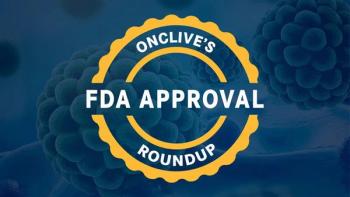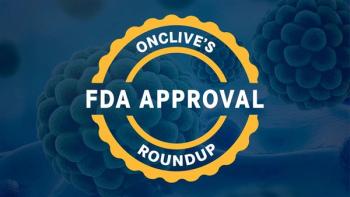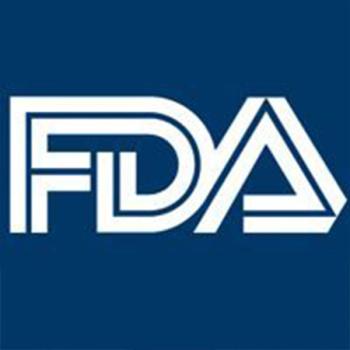
Bevacizumab Biosimilar Aybintio Approved in Europe
The European Commission has granted a marketing authorization to Aybintio, a bevacizumab biosimilar for the treatment of patients with the same types of cancer for which the reference product is indicated in the European Union.
The European Commission has granted a marketing authorization to Aybintio, a bevacizumab (Avastin) biosimilar for the treatment of patients with the same types of cancer for which the reference product is indicated in the European Union, according to Samsung Bioepis Co, Ltd.1
Specifically, the agent is indicated for use in metastatic colorectal cancer, metastatic breast cancer, non–small cell lung cancer, advanced/metastatic renal cell carcinoma, epithelial ovarian, fallopian tube and primary peritoneal cancer, and cervical cancer.
“We are proud to announce our second oncology biosimilar approval in Europe,” Christopher Hansung Ko, president and chief executive officer of Samsung Bioepis. “Approval of Aybintio provides another treatment option for patients with certain types of cancers enabling wider access to those in need.”
The decision was based on a comprehensive data package and totality of evidence which included analytical, pharmacokinetic, and clinical findings, in addition to pharmacology and toxicology data. These data indicated that Aybintio and the reference product were highly similar with no clinically meaningful differences observed.
In September 2019, Samsung Bioepis Co, Ltd submitted a biologics license application to the FDA, which was accepted just 2 months later. Findings from a phase 3 trial (NCT02754882) examining the biosimilar, which was previously referred to as
In the multicenter, double-blind trial, a total of 763 patients with metastatic or recurrent nonsquamous disease underwent randomization to receive either the biosimilar (n = 379) or the reference product (n = 384) in combination with chemotherapy comprised of paclitaxel and carboplatin every 3 weeks, followed by either the biosimilar or bevacizumab as maintenance treatment. Participants received treatment until disease progression, intolerable toxicity, or they completed treatment for 1 year after randomization of the last patient.
To participate in the trial, patients had to be 18 years of age or older, have an ECOG performance score ranging from 0 to 1, have histologically confirmed metastatic or recurrent nonsquamous disease, and have 1 or more measurable lesions per RECIST v1.1 criteria. Moreover, patients also had to be able to receive bevacizumab, carboplatin, and paclitaxel.
If they had a small cell carcinoma of the lung or squamous cell carcinoma diagnosis, had tumors that harbored EGFR or ALK alterations, were at increased risk of bleeding, or if they had a history of first-line chemotherapy in the metastatic or recurrent setting, they were not eligible for inclusion on the trial.
The primary objective of the trial was to determine the best ORR by 24 weeks of chemotherapy. Key secondary end points of the trial included progression-free survival (PFS), overall survival (OS), duration of response (DOR), safety, pharmacokinetics, and immunogenicity. In the full analysis set, the risk ratio was examined, and the risk difference was computed in the per-protocol set.
Findings demonstrated that the biosimilar had a best ORR of 47.6% versus 42.8% with reference bevacizumab in the full analysis set. Moreover, the risk ratio was 1.11 (90% CI, 0.975-1.269); this fell within the predefined equivalence margin (0.737-1.357).
The best ORR in the per-protocol set, was 50.1% with the biosimilar versus 44.8% with the reference product; here, the risk difference was 5.3% (95% CI, -2.2%-12.9%), of which the lower margin was contained and the upper margin was outside the predefined equivalence margin of (95% CI, -12.5% to 12.5%).
Moreover, the median PFS was 8.50 months in the biosimilar arm compared with 7.90 months in the reference arm; the median OS was 14.90 months and 15.80 months, respectively. The median DOR reported was 5.60 months and 5.85 months with the biosimilar and with reference bevacizumab, respectively.
In terms of safety, the overall incidence of treatment-emergent adverse effects (TEAEs) was found to be comparable between the 2 treatments arms, with 92.1% in the biosimilar arm and 91.1% in the reference arm. The most commonly reported TEAEs included alopecia, anemia, and nausea.
Notably, Ctrough and Cmax, and the incidence of overall antidrug antibodies were found to be similar between the treatment arms, at 16.1% with the biosimilar, and 11.0% with reference bevacizumab.
In June 2019, PF-06439535 (bevacizumab-bvzr; Zirabev), another bevacizumab biosimilar, received approval from the FDA for the treatment of patients with metastatic CRC, unresectable, locally advanced, recurrent, or metastatic nonsquamous NSCLC, recurrent glioblastoma, metastatic RCC, and persistent, recurrent, or metastatic cervical cancer.
Aybintio is the fifth biosimilar to receive regulatory approval in Europe; it now joins the list of Benepali (etanercept), Flixabi (infliximab), Ontruzant (trastuzumab), and Imraldi (adalimumab) in the treatment landscape.
References
- Samsung Bioepis receives European Commission approval for AYBINTIO (bevacizumab). News release. Samsung Bioepis Co, Ltd. August 20, 2020.
https://bit.ly/31dd1gn . - Reck M, Luft A, Bondarenko I, et al. A phase III study comparing SB8, a proposed bevacizumab biosimilar, and reference bevacizumab in patients with metastatic or recurrent non-squamous NSCLC. Ann Oncol. 2019;30(suppl 5):1565P. doi:10.1093/annonc/mdz260.087




































